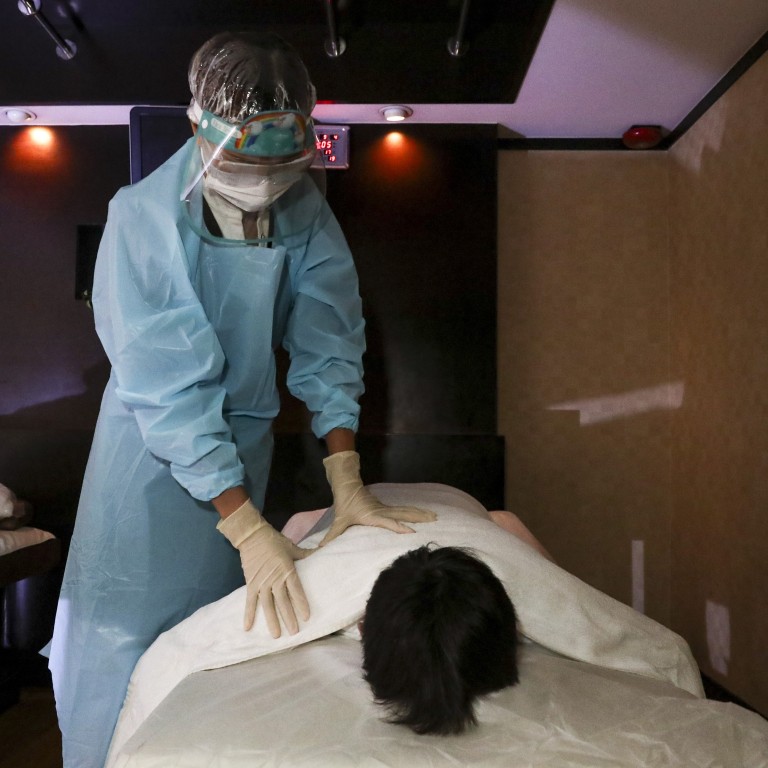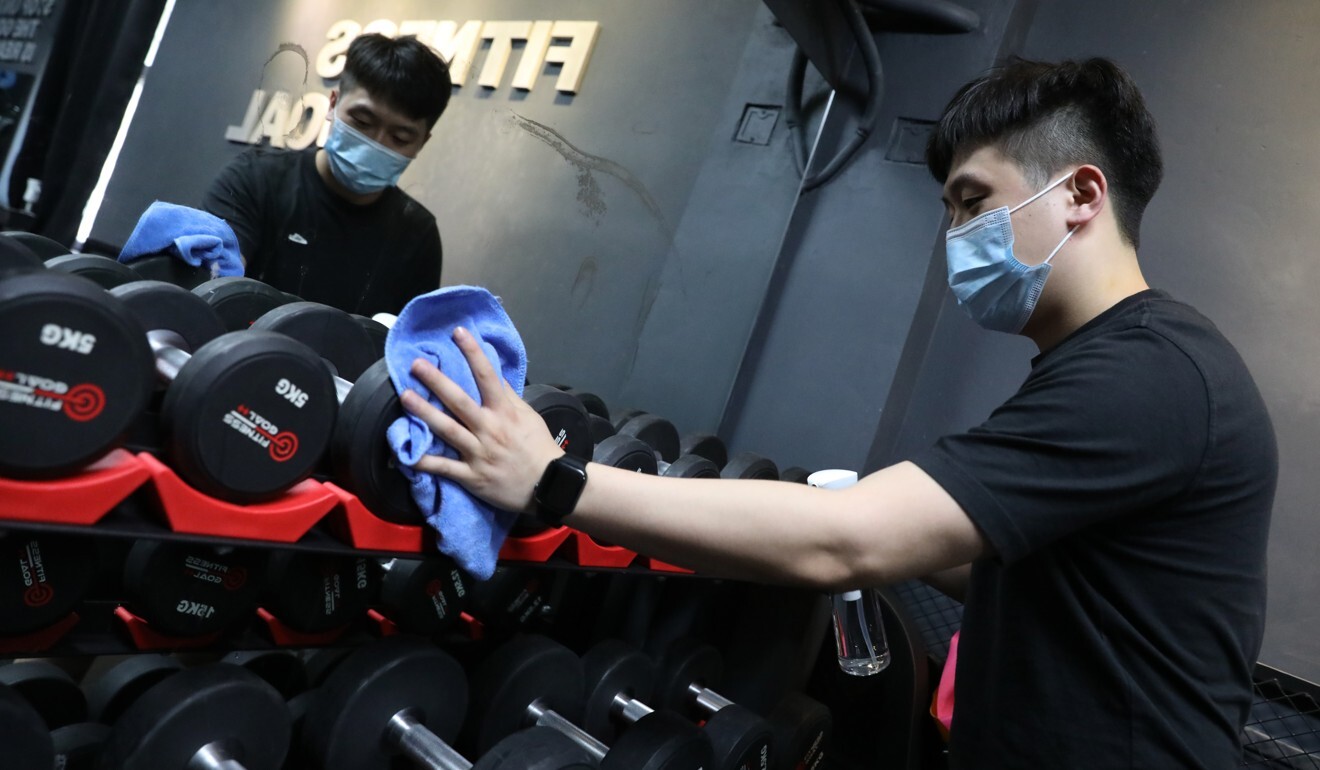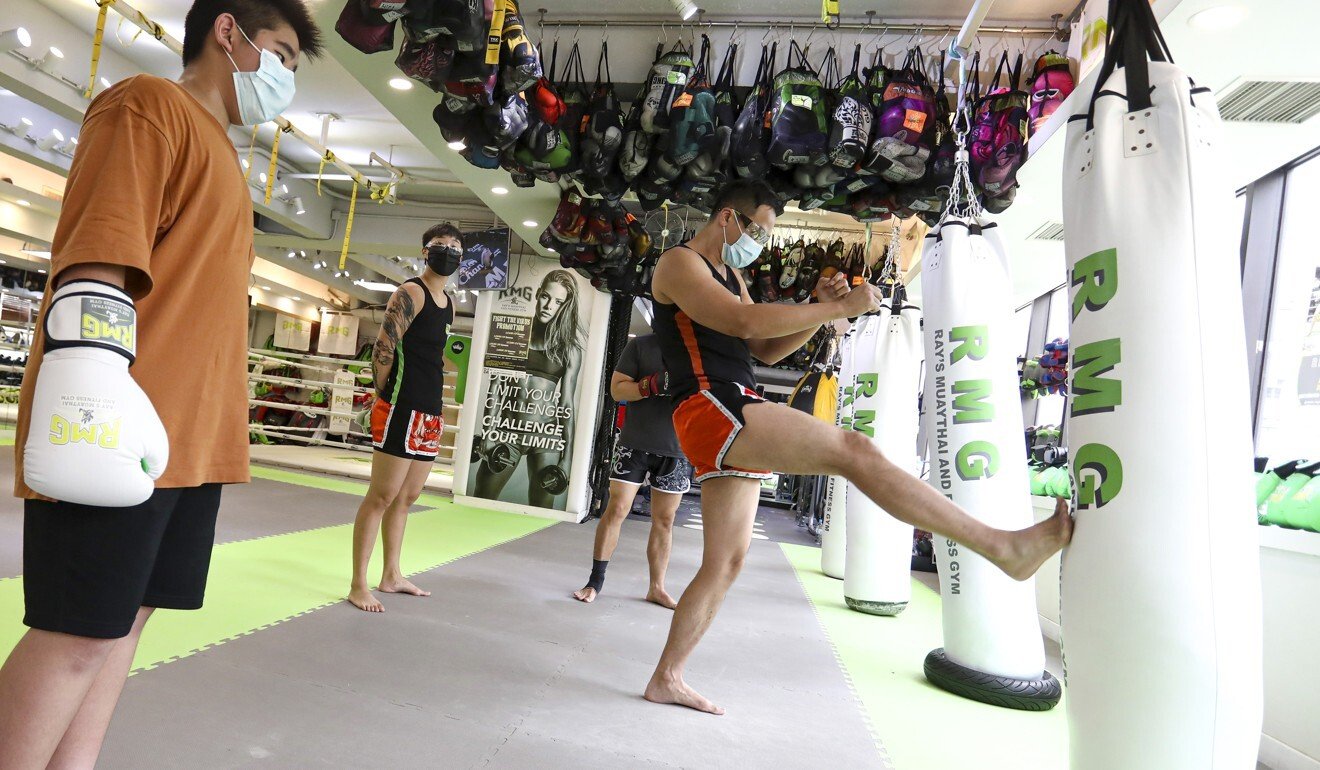
Hong Kong third wave: massage parlours and gyms finally reopen but where are all the customers?
- The Sauna & Spa massage parlour in Tsim Sha Tsui has spent tens of thousands of dollars on protective gear, but bookings down by half
- For Ray Or’s Muay Thai gym in Mong Kok, coaches can only teach a few students at a time, which means less pay for them
Operators have had to buy and stock thousands of masks, disinfectant, partitioning boards and other personal protective equipment, while staff must also ensure patrons stick to the two-person limit on gatherings.
As the daily number of infections citywide has fallen to single and low double-digits in recent weeks, the Hong Kong government is easing social-distancing rules that had included shutting a wide range of popular social spots. Last Friday, authorities allowed beauty parlours, cinemas and some outdoor sports venues such as tennis courts, golf courses and running tracks to reopen.
The list has now been expanded to include some indoor sports venues and clubhouses, as well as gyms and massage parlours. Restaurants can also operate evening dine-in services for one more hour, till 10pm.

The Sauna & Spa massage parlour in Tsim Sha Tsui resumed business but with a host of new measures adopted to prevent transmission risk. Staff must wear masks at all times and massage therapists are clothed in full personal protective equipment, which costs about HK$50 (US$7) each. Equipment is disinfected before and after each use and masks replaced after serving every customer.
Although full protective gear is not required by the government, the parlour wants to ensure customers feel confident the environment is hygienic, according to manager Joey Kan.
Hong Kong ministers defend Covid-19 mass testing, scheme to be extended for four days
“The expense of reopening is large,” Kan said. “Some tens of thousands of dollars were spent to clean the entire place. Before coming in, customers have their temperature taken, given a mask if they don't already have one and are provided with hand sanitiser.”
The parlour has already bought 100,000 pieces of PPE and 200 to 300 acrylic boards to separate customers, in addition to spending tens of thousands of dollars on masks.
But customers are still not returning. The parlour was largely empty in the morning and even at the traditional peak hour of 4pm, bookings were only half the usual number.
We would normally have 200 customers but now we have only about 100
“We would normally have 200 customers but now we have only about 100,” Kan said, pointing to social-distancing measures, the citywide economic crunch and general fears over contracting the virus as reasons for the poor turnout.
But one customer who was a regular at the establishment said he was not worried about contracting Covid-19, citing the rigorous cleaning.
“I am thrilled,” said Yip Ka-yung, a 40-year-old salesman as he sat in his bathrobe in the resting lounge. “I have waited for such a long time. I just want to relax.”
He said he made the appointment a day after the government announced massage parlours would reopen. Social-distancing measures would affect the atmosphere of the parlour, but there was no other option, he admitted.
At Mong Kok’s RMG Muaythai & Fitness Gym, owned by Ray Or Chuen-ting, only three students were training. Or said he usually had 16 students training at once on a typical September afternoon. He was already thinking of moving to a smaller venue given the monthly rent of HK$130,000 was squeezing him financially. Since Covid-19 emerged in Hong Kong in late January, gyms have been forced to close for a total of three months as the pandemic waxed and waned.
“This has had a very big impact on my finances,” said Or, who is also the convenor of the Fitness and Combat Sports Alliance. “Only a third of my students returned.”

The social-distancing rule limiting group sizes to two people has been eased for gyms, which can gather four people together. Although classes were fully booked on Friday, Or’s coaches could only teach three students at a time.
Small class sizes significantly reduce coaches’ pay, which mostly consists of bonuses that depend on the number of students they teach.
“I just hope I can pay this month’s rent,” Or said. “It’s a very small plea.” Students were only finishing courses they had already paid for, so no new revenue was coming in, he noted.
In addition to rent and wages, Or had to spend HK$2,000 on hundreds of protective goggles and more than HK$10,000 on masks for students.
Student Ray Kwan Wan-lap said he was very happy to be back in the gym as he could only do simple exercises at home or go jogging.

“Exercising with masks on is not the same,” said the 33-year-old traditional Chinese medicine practitioner. “But the coach reduced the intensity of the exercises and I got used to it eventually.”
Some operators in the catering sector remained dissatisfied with the situation, even after the latest relaxation. David Leung Chi-wai, chairman of Seafood Delight Group, said the extension of dine-in service by an hour to 10pm would not help much and should be brought to 11.30pm. The extra hour meant they would only serve a single additional round of customers. The limit on social gathering should be relaxed to allow four people to dine together, Leung said.
“When it’s only two people, we have only couples eating,” he said. “We need families. When more people come out, they have a greater urge to spend.
Operators of bars, which have been closed since July 15, complained they were not allowed to reopen, and said eateries with liquor licences were taking their business.
Cat Hou Chui-shan, chairwoman of Bartenders and Mixologists Union of Hong Kong, said bar owners were seeking government compensation and subsidies, as one in five establishments had either collapsed or were up for sale.
Meanwhile, the Education Bureau issued new guidelines to schools for the resumption of classes later this month, saying they should suspend face-to-face teaching immediately for one to two days if a Covid-19 case emerged, even if it was not yet confirmed.
The Centre for Health Protection earlier advised schools to close for 14 days if they confirmed a case on campus.

